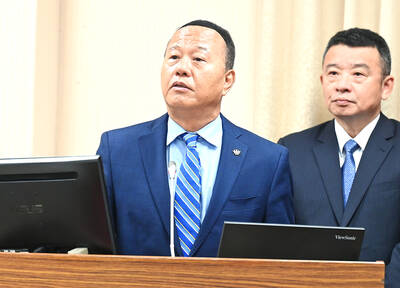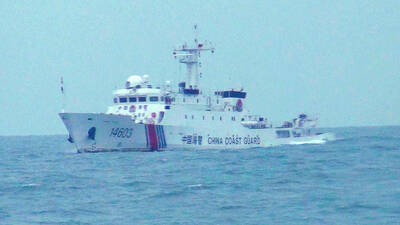President Ma Ying-jeou (馬英九) yesterday said he was confident Beijing had the same understanding of the “1992 consensus” as Taipei, adding that each side — both part of the same “Chinese nation” — had its own interpretation of “one China.”
Ma said he made clear in his inaugural address that his administration would maintain the “status quo” through the “three noes” under the framework of the Republic of China (ROC) Constitution and develop cross-strait relations on the basis of the “1992 consensus.”
The “three noes” refer to no discussion of unification with Beijing during Ma’s presidency, no pursuit of, or support for, de jure Taiwanese independence and no use of force to resolve cross-strait disputes.
Ma said the “1992 consensus” was an agreement reached by both sides in 1992 and Taiwan’s understanding was that each side had its own interpretation of what “one China” signifies.
“Recently, some representatives from the mainland Chinese authorities mentioned this consensus when they were here,” Ma said. “I believe their understanding is consistent with ours.”
However, on Feb. 21, 2006, then-Chinese Nationalist Party (KMT) legislator Su Chi (蘇起) admitted that he made up the term “1992 consensus” in 2000 when he was Mainland Affairs Council chairman. Su said he invented the term to break the cross-strait deadlock and alleviate tension before the KMT handed over power to the Democratic Progressive Party (DPP).
Ma said Taiwan and China had signed 14 agreements over the past two years “as a result of the consensus,” something he said had been a “rare occurrence” over the past 60 years.
“Both sides realize this is a historic juncture and should grasp the opportunity to improve bilateral ties as cross-strait detente is conducive to peace not only across the Taiwan Strait but also in East Asia and the whole world,” he said at the Presidential Office during a meeting with participants in an international forum on the People’s Liberation Army.
Some people recently proposed that Taipei and Beijing consider establishing a confidence-building mechanism (CBM), Ma said, but the Economic Cooperation Framework Agreement (ECFA) signed in June was a kind of CBM, because without mutual trust, both sides would not have signed such a complicated trade pact that requires both sides to commit to a long-term relationship.
Ma said his conciliatory approach was intended to ease cross-strait tensions so that Taiwan would have more time to respond to and become more capable of handling crises.
Taiwan must strengthen its defense capabilities, but it cannot afford to engage in an arms race with China, he said.
His administration would continue to purchase defensive weapons from the US that Taiwan cannot produce itself, but military hardware was not the only way to protect Taiwan, he said. This was why his administration has tried so hard to pursue economic and cultural exchanges with China, he said.
His cross-strait policy has -reduced tension across the Taiwan Strait and both sides have developed a certain degree of mutual trust, Ma said, adding that he hoped both sides would find the best solution to cross-strait disputes “under the guidance of Chinese culture” because both peoples are of one “Chinese nation” and all yan huang zisun (descendants of emperors Yan and Huang).
Ma sought to clarify his remarks about one “Chinese nation” later in the day, saying there were three common characteristics to the “Chinese nation”: They have the same ancestors and the same last names, come from the same towns and villages and go to the same schools.
ADDITIONAL REPORTING BY STAFF WRITER

VIGILANCE: The military is paying close attention to actions that might damage peace and stability in the region, the deputy minister of national defense said The People’s Republic of China (PRC) might consider initiating a hack on Taiwanese networks on May 20, the day of the inauguration ceremony of president-elect William Lai (賴清德), sources familiar with cross-strait issues said. While US Secretary of State Anthony Blinken’s statement of the US expectation “that all sides will conduct themselves with restraint and prudence in the period ahead” would prevent military actions by China, Beijing could still try to sabotage Taiwan’s inauguration ceremony, the source said. China might gain access to the video screens outside of the Presidential Office Building and display embarrassing messages from Beijing, such as congratulating Lai

Four China Coast Guard ships briefly sailed through prohibited waters near Kinmen County, Taipei said, urging Beijing to stop actions that endanger navigation safety. The Chinese ships entered waters south of Kinmen, 5km from the Chinese city of Xiamen, at about 3:30pm on Monday, the Coast Guard Administration said in a statement later the same day. The ships “sailed out of our prohibited and restricted waters” about an hour later, the agency said, urging Beijing to immediately stop “behavior that endangers navigation safety.” Ministry of National Defense spokesman Sun Li-fang (孫立方) yesterday told reporters that Taiwan would boost support to the Coast Guard

GLOBAL: The slogan would be advertised in popular tourist destinations in North America and Europe, such as Champs-Elysees and Times Square, the agency said “Taiwan: Waves of Wonder” is to be the country’s new tourism slogan for the next 10 years, the Tourism Administration said yesterday, adding that it would be showcased in commercials at the Olympic Games in Paris and other major cities and travel fairs around the world. The new slogan, logo and theme song, which were unveiled at a news conference in Taipei, marked the agency’s latest effort to attract 10 million international visitors to Taiwan this year, a goal that it readjusted earlier this year, as China has yet to lift its travel ban to Taiwan. The administration created the “Taiwan: Touch

BOOST TO SPORTS? The Executive Yuan said that the amendment was introduced to attract professionals to Taiwan, and increase the incentives for naturalization The Legislative Yuan yesterday passed on third reading an amendment to the Nationality Act (國籍法) that would reduce the minimum residency period required for highly skilled professionals to apply for naturalization from three to two continuous years, with a minimum of 183 days in Taiwan each year. The 183-day requirement does not apply if an eligible applicant has lived legally in the territory of the Republic of China for more than five continuous years. Taiwan’s professional basketball leagues are expected to benefit from the amendments, which would allow them to recruit more players from overseas. Prior to the passage of the amendment, the